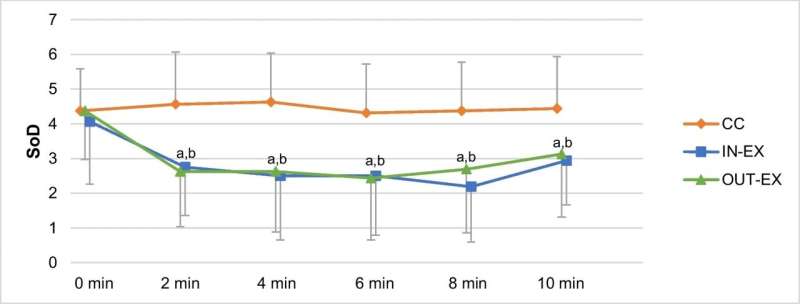This article has been reviewed according to Science X's editorial process and policies. Editors have highlighted the following attributes while ensuring the content's credibility:
fact-checked
trusted source
proofread
Brisk walks found to support smoking cessation

Good news for anyone who wants to quit smoking in the new year: In a recently published study, Innsbruck scientists show that ten-minute brisk walking sessions reduce the cravings of temporarily abstinent smokers and improve their overall well-being. The study is the first to compare the effect of indoor and outdoor activity on smoking cessation.
Smoking is one of the leading preventable causes of disease and death worldwide. According to the World Health Organization (WHO), although global tobacco consumption is steadily declining, around 20 percent of people over the age of 15 still smoked in 2020.
Anyone who has good intentions for the new year and wants to give up smoking can benefit from the results of a study carried out at the Department of Sport Science: 10-minute exercise sessions in the fresh air, but also indoors, reduced the participants' cravings and alleviated withdrawal symptoms.
In their publication, which appeared at the end of November in the journal Psychopharmacology, scientists from the University of Innsbruck and the Medical University of Innsbruck also report that exercise sessions improve emotional well-being.
Outdoor activity integrated
"There are several studies on the effect of indoor exercise sessions on temporarily abstinent smokers, ours is the first to include outdoor activity," says first author Stefanie Schöttl, a doctoral student at the Department of Sport Science at the University of Innsbruck.
For the study, three different interventions were carried out with 16 smokers, each of whom was smoke-free overnight. In random order participants undertook a ten-minute brisk walk outdoors, the corresponding exercise unit on an indoor treadmill or remained seated for ten minutes.
"We randomized all participants and subjected them to all conditions with corresponding treatment-free phases in order to exclude individual preferences," explains Martin Kopp, Professor of Sport and Exercise Psychology, the study design. Before, during and after the respective interventions, the participants were asked about cravings, withdrawal symptoms and mood using validated instruments.
"They also reported the length of time until their next cigarette to us," adds Stefanie Schöttl. The following significant results were found: The craving decreased in both the indoor and outdoor groups during the entire exercise session, while it remained unchanged in the control group.
The same applies with regard to withdrawal symptoms and general well-being. After twenty minutes, no differences were measurable. After 10 minutes, the craving was slightly lower in the outdoor group than in the indoor group. "Another—albeit not significant—difference between indoor and outdoor exercise sessions is the time that passes before the next cigarette," reports Stefanie Schöttl.
This was 17 minutes for the indoor group and 26 minutes for the outdoor group. "This is a trend that still needs to be verified in future experiments," says Martin Kopp, "possibly by changing the duration or intensity of the sessions." However, the top priority for the scientists is that the walking units are easy to incorporate into everyday life. "The interventions should be defined in such a way that they can be integrated 1:1 into smoking cessation programs," the authors write.
More information: Stefanie E. Schöttl et al, Acute effects of outdoor and indoor walking on cigarette cravings, withdrawal symptoms and affective response during temporary smoking abstinence, Psychopharmacology (2023). DOI: 10.1007/s00213-023-06506-4





















